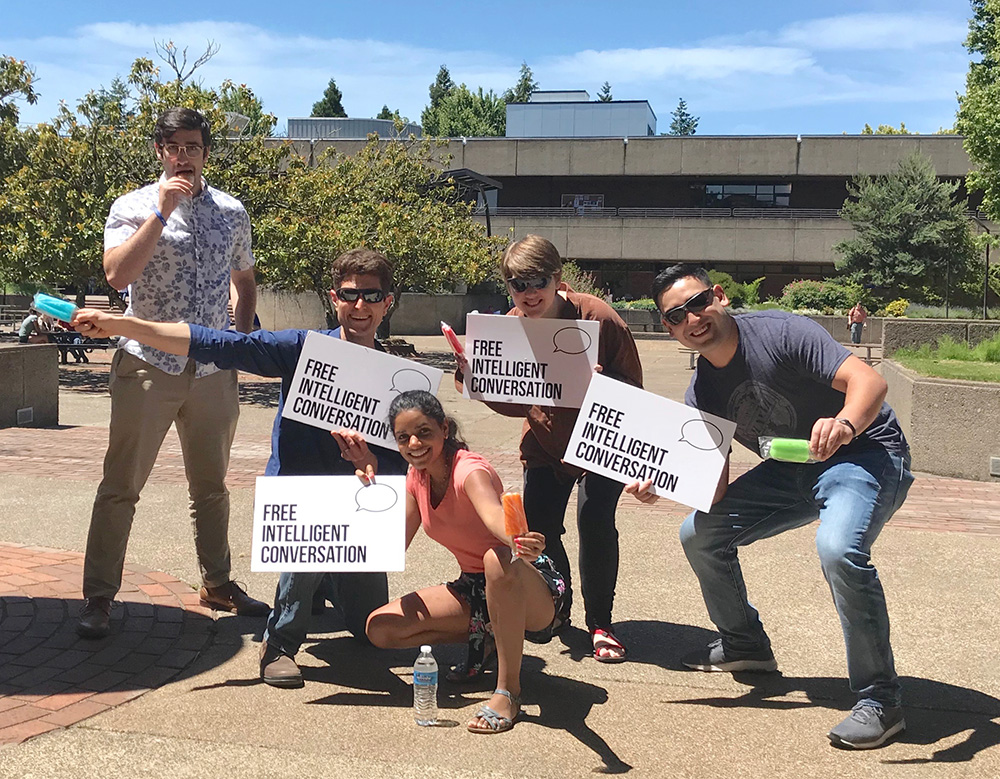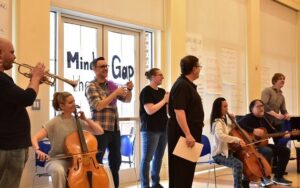One of the most tenacious divisions in today’s America centers on what can and can’t be said on college campuses. But beyond the controversial flashpoints about who can speak and what they can say lies an exciting opportunity: What happens in a classroom that doesn’t just accept a diversity of opinions but actively encourages them? How can instructors invite students to listen conscientiously and share their opinions fearlessly but constructively? What does it look like when college students not only tolerate but actively seek out conversations with people who have viewpoints different from their own?
At Linn-Benton Community College in Oregon, communication professor Mark Urista has had the opportunity to experiment — and succeed — with cultivating exactly those sorts of encounters among his students. His path toward productive student conversations emerged via Braver Angels-inspired debates that have enabled students to engage with one another over divisive issues in a respectful, well-managed environment.
What happens in a classroom that doesn’t just accept a diversity of opinions but actively encourages them?
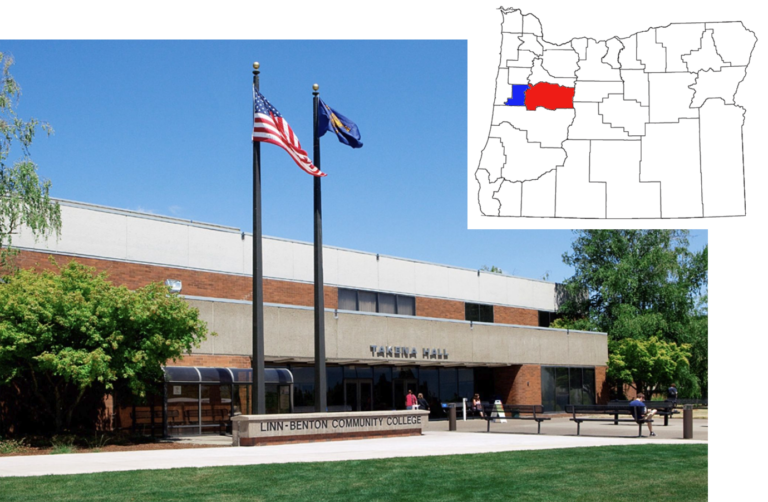
Linn-Benton is an ideal testing ground for conversations between opposites. The college draws its students from two politically divergent counties: Linn County, which has voted for the Republican candidate in every U.S. presidential election since the 1970s, and Benton County, which has voted for the Democratic candidate in every U.S. presidential election since the 1980s. “We are the vector that can bring people together,” Mark said.
He added that community colleges in general are far more diverse than universities or small liberal arts colleges, where people live on campus or in a one- to two-mile radius. Traditional universities can create a bubble disconnected from reality, while community colleges offer more exposure to the world, and to people from different backgrounds and circumstances.
Mark is himself the graduate of a community college, El Camino Community College in southern California. One of the things he treasured about his years at the school was the wide variety of fellow students he encountered there. “El Camino brought people together from all these different corners of Los Angeles, then put them in a room and had them read philosophy, and we could share our perspectives.”
Another transformative experience for Mark at El Camino came when he joined the debate team. “I loved it,” he said. “It awakened the learner in me.” He transferred to UC Berkeley and did debate there for a year, but as the years went by and he became an educator himself, he lost his passion for the debate model he had been taught. “I realized competitive debate wasn’t feeding my soul in how I wanted to be an instructor.” He still wanted his students to have debates and dialogue, but he wanted to change the goal from winning to growing as a person—and as a group.
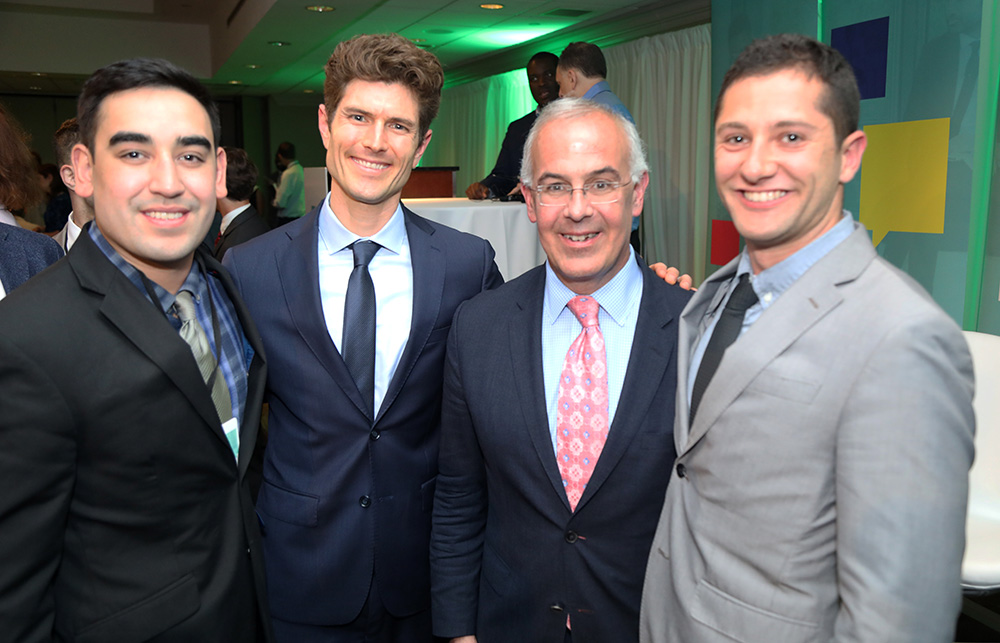
He first learned about Braver Angels through New York Times columnist David Brooks, who mentioned the organization in an op-ed in 2018. “The Braver Angels mission just naturally spoke to me,” said Mark, who describes himself as a true Independent. His father was Red—a Hispanic U.S. Army veteran who was a champion of Reagan; his mother was Blue—an Anglo inner-city schoolteacher who thought Reagan was dismantling the nation’s safety net. Mark considers himself Purple and has voted for people in both political parties, as well as Independents.
In addition to teaching public speaking, argument and critical discourse at Linn-Benton, Mark serves as the faculty advisor to the college’s Civil Discourse Program, a club that promotes dialogue among individuals with diverse viewpoints. In spring 2019, the civil discourse program hosted two Braver Angels leaders, Ciaran O’Connor and John Wood, Jr., who visited the campus and did a presentation on the state of polarization in the United States.
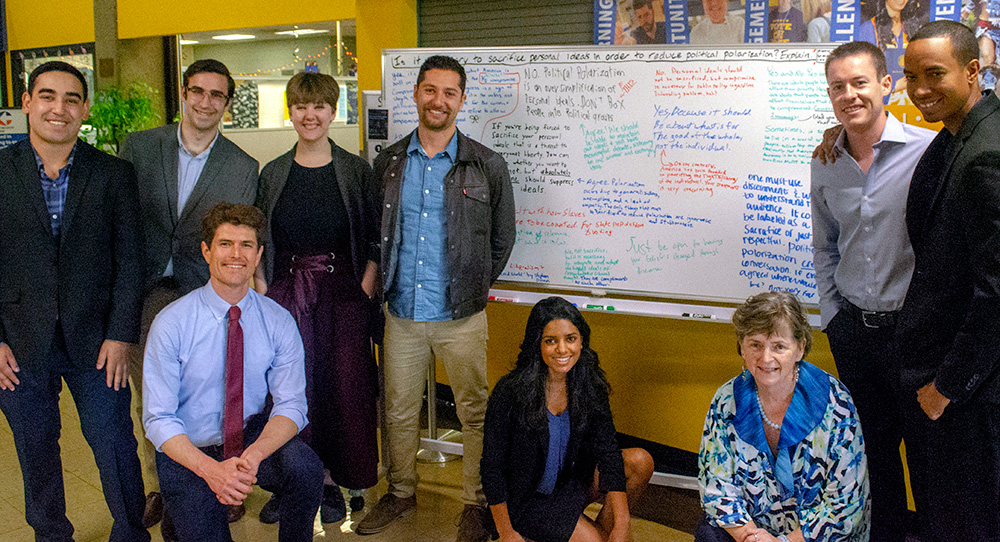
A year later, when the COVID-19 pandemic hit, Mark, like educators everywhere, suddenly had to teach all his courses online. “I was scratching my head: how am I going to do normal communication classes through a screen? It felt impossible. I decided to build a new class from scratch and used it as an opportunity to use Braver Angels resources.”
One of the elements he wanted to incorporate was the Braver Angels approach to debates. He again reached out to John Wood, Jr. and Ciaran O’Connor and asked if they could help him structure debates for his class. The timing turned out to be perfect, because Braver Angels was preparing a debate model for college classrooms and the program’s leaders, April Lawson and Doug Sprei, saw Mark’s class as a good opportunity to pilot the idea and see if it could become part of the curriculum.
Mark has found he often needs to explain the non-competitive nature of the debates that go on his classroom. Many people have a negative connotation of debates: they think of presidential debates, where each candidate is clearly trying to dominate the other. Mark acknowledges that a lot of college debate also heavily emphasizes winning and overwhelming your opponent. But debates built on Braver Angels principles are closer to a Socratic pursuit of the truth, in which those taking part explore a topic collaboratively through a dialogue of thought-provoking questions.
“These debates aren’t about winning and losing but about understanding and humanizing.”
Based on a curricular toolkit available through Braver Angels, the debates help students develop key skills, including how to construct an argument. “These debates aren’t about winning and losing but about understanding and humanizing,” Mark said.
He added that he has never received any negative feedback. “What I typically hear from students is, ‘Wow, that went a lot better than I thought it would,’ or ‘This felt more like a discussion than a debate.’ They see the debate structure as essential for good give-and-take and healthy dialogue.”
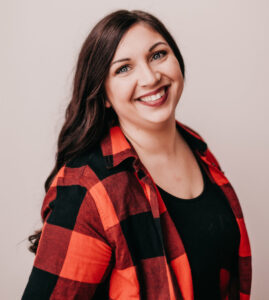
Cheyanne Rider is a student leader with the Linn Benton-Civil Discourse Program who is dual–enrolled at Linn-Benton and Oregon State University. She regularly takes part in the program’s debates and its op-eds, which are published in the college’s newspaper, The Commuter. She said that from the first debate she attended, she was hooked. “Everyone got to be heard and got to express their own opinions. Nobody interrupted.” She explained that the debates are moderated by a chair, and participants ask their questions through the chair, not directly to one another, which she believes makes people less likely to get defensive. “It’s more removed, so you can keep thinking clearly to answer the question.”
Mark admitted that a lot of colleagues have told him they feel nervous about encouraging these types of conversations in their classrooms. He begins by pointing out that being nervous is normal, and it’s okay to be scared. He then encourages them and tells them that this is an incredible opportunity to manage emotions and tackle the task at hand.
He also tells people that being in a college environment makes the work easier. In society, we need spaces where it’s safe to have open, honest dialogues about controversial issues. And if there’s any place where that should be the case, he said, it should be college campuses. “That belief helps me manage any uncomfortable emotions that come up. Even if I get anxious, I am grounded that what we are doing is the right thing.”
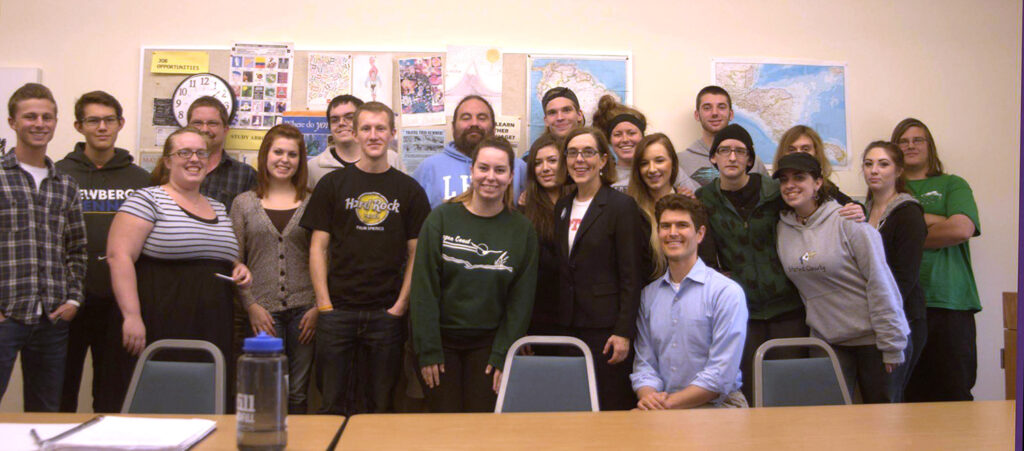
He feels fortunate and grateful to be at Linn-Benton. “I don’t know if there are many other colleges that would let me do this work at this magnitude. We seem to have all the right ingredients, including ideological diversity and strong college leadership in support of this work. A lot of administrators are nervous to stick their neck out for free expression work in public. Fortunately, our college leadership has done that.”
One challenge for educators is learning how to set the tone for constructive conversations. “Training is absolutely essential,” Mark said, adding that professors aren’t taught this sort of facilitation—or even teaching in general—while in grad school. “They’re taught to do research and academic papers while writing a thesis or dissertation. They aren’t trained how to facilitate conversation, particularly about controversial issues.”
Part of what has made Mark’s depolarizing efforts successful is an unwritten rule: Don’t be a jerk. In Mark’s syllabus, there’s also a more formal, written statement on tolerance: “In this class there may be times when you disagree with opinions being expressed. It is important that you respond to these opinions in an appropriate, respectful, and professional manner. Healthy disagreement and discussion are a central component of this class and are encouraged but must be done on a professional and constructive basis.”
He has found that students are eager to have these conversations, and they often do a better job at it than some of his colleagues. “A lot of the students have found it refreshing to have open and authentic conversations with people they didn’t know. When someone has a conversation with a friend, even if you’re talking about something for the first time, they know the other person has good intentions. What is nice is that the Braver Angels model allows you to have that same experience with people who haven’t developed a lot of trust or rapport yet.”
“We are proving that if you have the right facilitator and structure, you can create an environment where a wide range of views can be shared respectfully, and we can all learn something together.”
Mark and his students have now been doing this work for almost five years, and they continue to see success and get positive feedback. “That evidence makes us confident we are doing the right thing; we can trust we have a system in place to talk about these issues. I think we are proving that if you have the right facilitator and structure, you can create an environment where a wide range of views can be shared respectfully, and we can all learn something together.”
The experience has had a big impact on Cheyanne, who is now majoring in speech and communication at Oregon State. “The work that we do is my favorite part of being in school so far, and something I hope to keep doing long after I graduate.”
According to Doug Sprei, Mark has played a vital role in building the reputation of the Braver Angels College Debates and Discourse program across the higher ed space. “Our collaboration with Mark has brought insights to help us scale the program nationally. Because he speaks the language of faculty, it’s only fitting that he was the lead designer of our Curricular Toolkit, showing how Braver Angels debates can be offered as a classroom assignment. Hundreds of professors and instructors have downloaded it and many are using it successfully. New institutions are contacting us almost every week, and there’s no end in sight to the demand out there.”
“This work is incredibly rewarding,” Mark said. “Working with Braver Angels and putting on these debates has given me a new sense of purpose and direction as an educator. Hopefully, that is a message that will resonate with a lot of professors.”
If you’d like to learn more, please check out Braver Angels College Debates and the curricular toolkit. To suggest more stories we could report about the Braver Angels community, submit a story idea here or send me a note at stephanie@braverangels.org.

